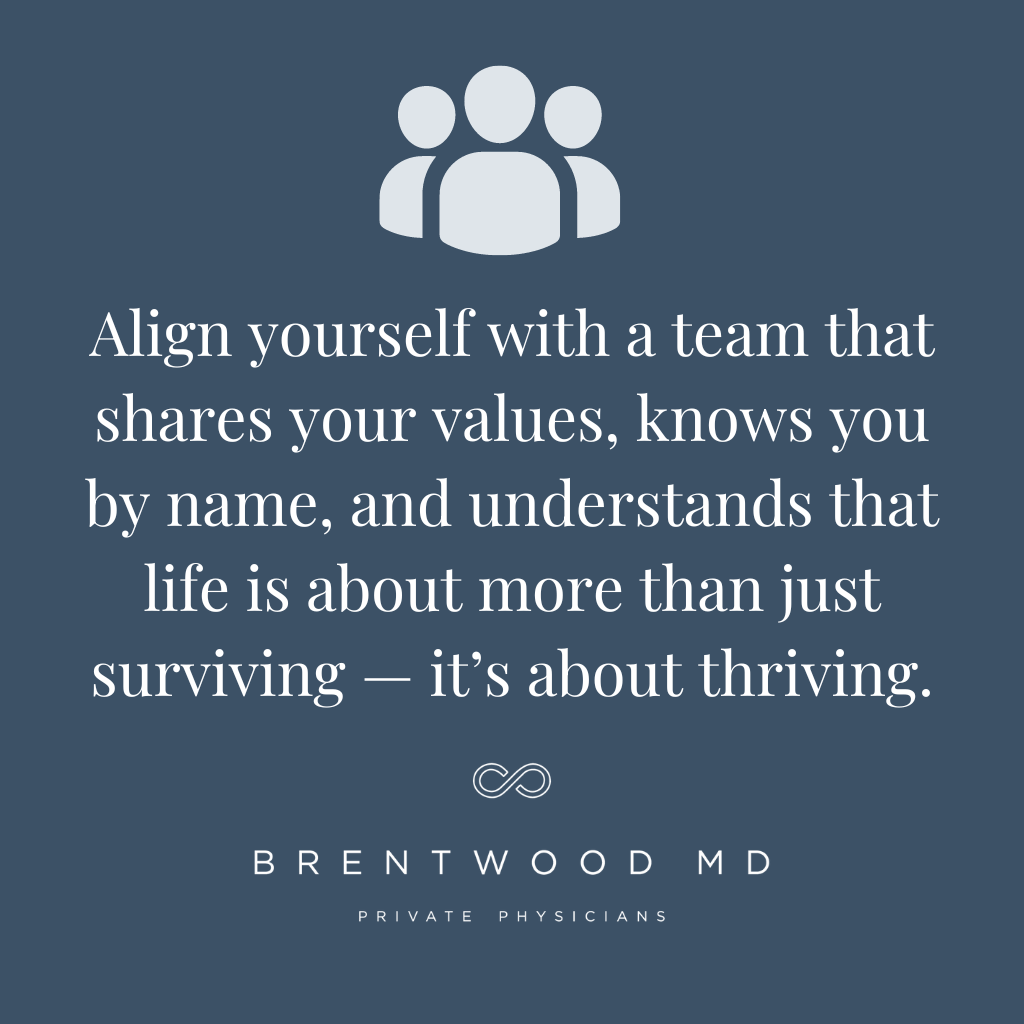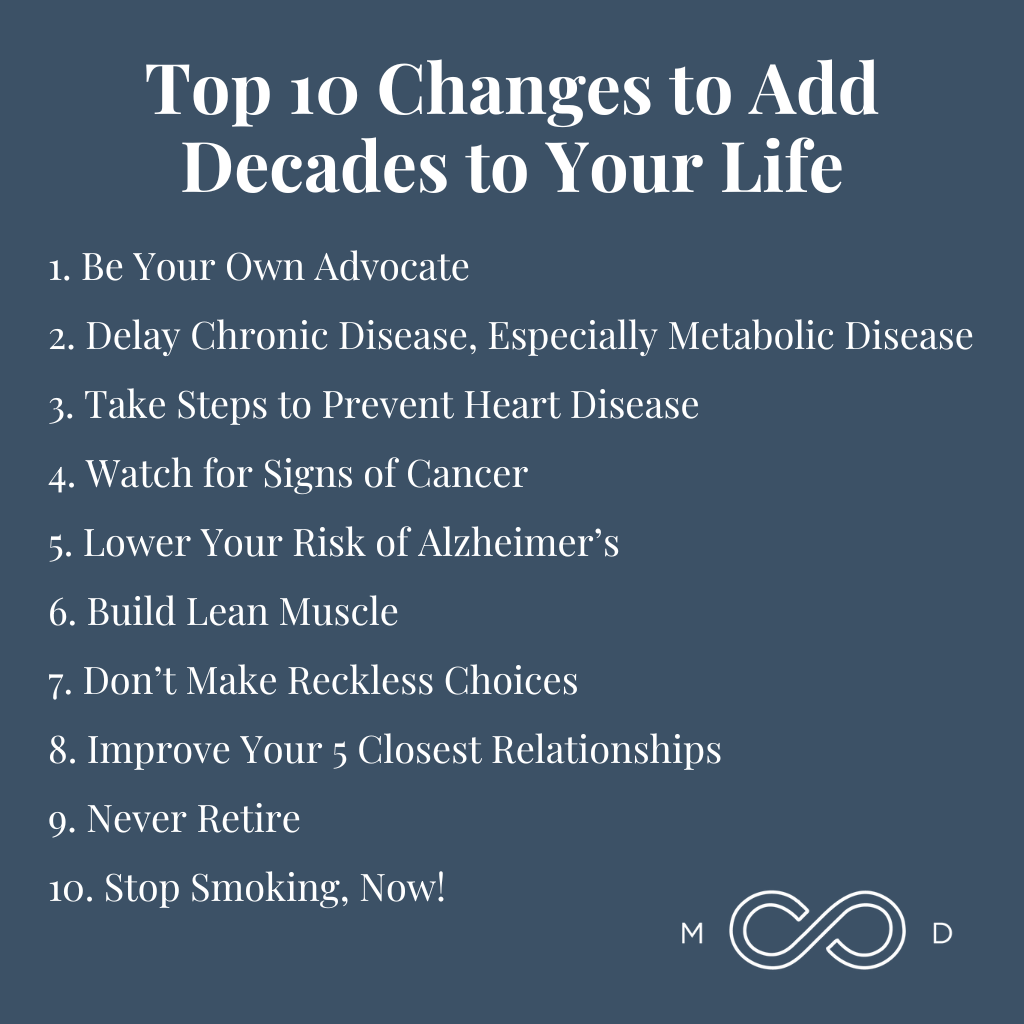Download file | Play in new window | |
Living a long life isn’t just about the number on your birthday cake. Most of us would prefer to celebrate our 70th birthday feeling strong, sharp, and vibrant rather than weak, fatigued, and helpless. But the latter is what we often picture when we think of our latter years.
The average life expectancy in our country is about 78 years, up from 70 years just a few decades ago. Modern advances in medicine, health education, and many other factors now make it possible for humans to live longer than ever before. We just need to take advantage of it!
That said, 78 doesn’t need to be the limit. It’s possible — even simple! — to add 30 productive and vibrant years to your life. Your grandfather might have been resigned to a lifespan of 60, but you don’t have to be.
With a strategic health and lifestyle approach, 90 can be the new 60.
Top 10 Changes to Add Decades to Your Life
1. Be Your Own Advocate
Our current model of healthcare isn’t designed to make you well; it’s designed to keep you from dying. That’s why I call our modern system not “health care,” but “sick care.”
If you go to the best heart hospital on the planet (Cleveland Clinic) while having a heart attack, you’re in the right place. But if you walk in and ask them how to optimize your heart health to improve your longevity, they’ll just stare at you.
The modern medical system has gotten better and better at helping people in advanced stages of illness. But if you want to prevent illness, if you want to go on offense and hunt for the things that will cut short your life, then you have to take the lead.
No one can want for you what you don’t genuinely want for yourself. When it comes to your health, you get out what you put in.
What does this look like?
- Share your goals and concerns with your doctor, and make your priorities clear.
- Share your family history and your own history.
- Ask about steps you can take to prevent chronic illness.
- Disclose all prescriptions, over-the-counter meds, and supplements you take.
- Do your research and ask lots of questions.
- Ask for clarification on anything you don’t understand.
Part of self-advocacy includes something I call finding your team. Look for a physician who shares your values and respects your health goals. Otherwise, you’ll encounter friction from the very beginning.
2. Delay Chronic Disease, Especially Metabolic Disease
Now that we’ve exited the game of high-risk poker that is smoking, what’s next?
Next, we tackle the less obvious but wildly important matter of blood sugar and insulin.
If you could only choose one factor about your health to control, choose your blood sugar. Balanced blood sugar is the holy grail of health. It supports ongoing health in many ways, while unbalanced blood sugar sabotages the body in just as many ways.
Why Blood Sugar Matters
Every time you eat (or drink) something, you must think about its impact on your blood sugar. Having low blood sugar is dangerous, but so is having high blood sugar. To get excess sugar (glucose) out of your bloodstream, your pancreas deploys a substance called insulin to transport glucose into your cells for energy.
This sugar-insulin-energy process is natural and essential to good health. Unfortunately, it can’t withstand the long-term pressure of unhealthy lifestyles and eating habits.
More time with elevated blood sugar (blood glucose) means more time with insulin in your system. And more time with insulin present means more resistance to that insulin from your cells. Like an insulin addict, your body then needs greater and greater amounts of insulin to get the same effect — until, eventually, this once-elegant system fails and you end up with uncontrolled high blood sugar (and high insulin levels).
In other words, you end up with diabetes.
If your blood sugar levels get out of control, the consequences become worse with every passing day. And half of all Americans live every day with too much sugar in their blood.
If your elevated blood sugar and insulin resistance are allowed to progress to diabetes, you end up with thickened blood that makes your heart work too hard, blood vessel damage, heightened blood pressure and cholesterol, and more. Over time, these factors lead to significant and potentially deadly complications, such as:
- Obesity
- Heart attack
- Stroke
- Nerve damage
- Vision problems and/or blindness
- Teeth and gum infections
- Erectile dysfunction
- Kidney damage
- Poor blood flow
- Slow and inefficient wound healing
- Amputations
Normalize Blood Sugar for Better Health
Healthy fats and lean proteins don’t contribute excess glucose to your blood, so they don’t send your blood sugar levels surging. Refined carbohydrates and processed foods, on the other hand, immediately overload your bloodstream with excess glucose.
As a result, one major lever to pull for stabilizing your blood sugar is changing what you eat. Nothing raises your blood sugar faster than carbohydrates, especially those high in sugar and refined carbs.
Steer clear of white bread, crackers, chips, pastries, and other carb-dense foods. Instead, opt for carbs that are high in fiber and low in sugar, like nutritious whole grains or steel-cut oats.
The second lever for you to pull is to change when you eat. Intermittent fasting is an excellent eating strategy for tackling insulin resistance that focuses less on deprivation and more on discipline. Rather than eating less, you simply put a longer window of time between dinner and breakfast.
Of course, always consult your physician before starting a practice like intermittent fasting. While it offers benefits for many, it isn’t appropriate for every person.
3. Take Steps to Prevent Heart Disease
Heart disease is the ultimate killer, causing about one out of every five deaths in America. Cardiovascular disease isn’t one disease or event, but an umbrella term that encompasses three distinct disease processes: hypertension, heart attack, and stroke.
There’s no single cause of heart disease, but certain habits and lifestyles accelerate its development, especially factors like smoking and uncontrolled diabetes.
The Most Preventable Causes of Heart Disease
As you already know, smoking is the leading cause of preventable death in our country. It doesn’t just lead to lung cancer and COPD, but heart disease as well.
The chemicals in tobacco smoke cause the cells that line blood vessels to become inflamed and swollen. This narrows the blood vessels, prevents proper blood flow, and triggers conditions that increase the likelihood of heart attack and stroke.
Diabetes is also a major contributing factor to heart disease. In fact, it’s so dangerous that it’s considered a “coronary artery disease risk equivalent.” Even if you don’t have documented heart disease, a diabetes diagnosis poses the same threats to your body.
How to Reduce Your Risk of Heart Disease
Getting heart disease isn’t like breaking your arm, where your body is fine one minute and injured the next. Heart disease develops over time. Unfortunately, the subtlety — or lack — of symptoms leads many intelligent and successful adults to kick change down the road, thinking, I’m just borderline; I’ll be fine.
“Borderline” blood pressure, blood sugar, or cholesterol readings don’t mean “healthy.” The term “borderline” sounds fairly innocuous, but the truth is that borderline diagnoses signal a final opportunity to turn the ship before hitting an iceberg.
If you really want to avoid heart disease and enjoy a life unrestricted by chronic health problems, taking action now can help you avoid a crisis. Some of the most powerful changes you can make are surprisingly subtle:
- Don’t accept “borderline” as safe
- Know your blood pressure and cholesterol numbers
- Eat real, whole foods and consider intermittent fasting
- Get regular exercise
- Attack insulin resistance
Know Where You Stand
Since cardiovascular disease often presents no symptoms until your condition becomes serious, it’s important to look beneath the surface for known indicators. Once you know where you stand, you can take the most effective action to reverse course.
The historical approach to monitoring for heart disease hasn’t produced enough improvement — not when heart disease is still the number one killer in America. Fortunately, medicine has advanced beyond sticking to EKGs and basic cholesterol testing.
While those tests can be useful, the following strategies are far more effective in the fight against encroaching heart disease:
- Evaluate your metabolic health (insulin resistance, visceral fat, blood pressure).
- Ask about advanced lipid testing (lipoprotein a and Apo B or LDL particle number).
- Consider a Cleerly study.
- If you snore, get a sleep study to check for sleep apnea.
Once you have eyes on your true state, you can discuss steps for improving or maintaining your health with a proactive medical team.
4. Watch for Signs of Cancer
More than 1,600 people die from cancer in the U.S. every day, with nearly 5,500 cancer diagnoses being handed out per day. Those are devastating statistics, which is why it’s so important to watch for signals that let you address any cancer as early as possible.
First, it’s helpful to know which cancers pose the biggest threat to your health based on your gender and age:
- Gynecological cancers most threaten women in their 20s, 30s, and beyond.
- Breast cancer is the most common cancer in American women, especially after age 40.
- Colon cancer begins in the late 40s of both men and women.
- Testicular cancer is the biggest threat to young men.
- Prostate and colon cancers are the most common cancers in older men.
While cancer used to be a death sentence, unprecedented medical and scientific advances have provided treatments with higher success rates than ever before. In fact, there are 18.1 million cancer survivors living in our country right now.
When we catch cancers early, they’re significantly more susceptible to treatment and often beatable. No one dies from stage 1 cancer if identified then. When diagnosis is delayed to stage 2, 3, or 4, however, treatments become less effective, complications more likely, and outcomes worse.
Hunt Cancer Down Early
One major issue with diagnosing cancer early is that early-stage cancer doesn’t cause symptoms. Once symptoms appear, you’ve entered late-stage territory. So actively hunting for early-stage cancers is crucial.
As of today, the medical community has five routine cancer screenings available for five major types of cancer:
- Breast cancer: mammograms
- Prostate cancer: PSH
- Cervical cancer: pap smear
- Colon cancer: colonoscopy
- Skin cancer: in-office visual exam
Besides early detection, some of these screenings even act as prevention. Colonoscopies allow doctors to remove potentially cancer-causing polyps, and skin checks allow dermatologists to remove potentially cancer-causing growths ahead of time.
All these screenings are tried and true and do an excellent job of identifying these common cancers early. But you may have noticed a glaring problem: There are more than five types of cancer. How can you detect potentially deadly cancers, like pancreatic or liver, early if they don’t have regular screenings?
The great news is that recent advances have produced a screening test that looks for over 50 types of cancer. And all it requires is a simple blood draw. The bad news? Because the test is relatively new, insurance companies won’t pay for it, and your doctor may not even know about it.
The Galleri test, produced by a company called GRAIL, uses advanced DNA testing to search for specific cancer DNA fragments in the blood. Based on these fragments, it predicts both the type and location of the cancer for further testing.
The five traditional screening methods plus the Galleri test open the way for many people to ensure late-stage cancer doesn’t catch them by surprise. But that only holds true for those who actually get their screenings.
Don’t Delay Your Screenings
It’s incredibly easy for busy professionals to put their health on the back burner. Too, cancer screening can be an anxious process, something that’s easier to ignore because you don’t want to entertain the possibility of an unfavorable result.
If this sounds familiar, let me first say that you’re not alone. These are normal feelings around cancer screening. But it’s also important to acknowledge that skipping screenings places you at risk.
If you’re going to get cancer, then you want to catch it in the earliest window possible. Don’t put off screenings for fear of opening Pandora’s Box; in this case, not looking at it won’t keep it closed.
Regular screening exams will help uncover hidden cancer early enough for you to get the treatment you need to keep on living an active and rewarding life.
5. Lower Your Risk of Alzheimer’s
If you’re committed to living a long and productive life, then Alzheimer’s dementia is a disease you can’t ignore. This irreversible and progressive brain disorder is the seventh leading cause of death in the United States and the most common cause of dementia in older adults.
Alzheimer’s disease presents itself in a few distinct ways:
- Memory problems
- Wandering and getting lost
- Difficulty handling money and paying bills
- Personality and behavior changes
- Inability to communicate with or recognize others
- Hallucinations and delusions
- Complete dependence on others
It’s a truly devastating disease, one the entire medical community still needs to better understand.
What Causes Alzheimer’s?
Despite extensive research over the last 25 years, progress on Alzheimer’s disease remains largely elusive. We don’t know enough, which means we can’t fully explain how to protect ourselves from this aggressive form of dementia.
We do know that brains affected by Alzheimer’s contain clumps of amyloid plaques and tangled bundles of fiber that cause neurons to lose their connections with each other and die. Unfortunately, pursuit of this factor has proven to be a red herring; it’s likely a downstream symptom of the disease rather than a cause.
That said, we do have some insights into prevention. Genetics, lifestyle choices, and environmental factors all appear to influence the development of Alzheimer’s disease.
How to Protect Yourself From Alzheimer’s Disease
Until our understanding of the mechanisms of Alzheimer’s improves, the best way to protect yourself is simply to improve your lifestyle habits. Most importantly, exercise every day, stop smoking, eat a brain-healthy diet, and get enough sleep every night.
When you smoke, sit still all day, and eat junk, your blood sugar levels surge while blood circulation falls. This is a dangerous double whammy that slows the flow of healthy, oxygenated blood to your brain. Even worse, the blood your brain does receive is compromised and tainted.
My intuition tells me that poor and poisoned blood flow to the brain triggers inflammation of the brain tissue, aggravates the blood vessels, and accelerates the conditions that create Alzheimer’s. The good news is that if you’re already taking steps to prevent metabolic disease and diabetes, you’ll automatically shield yourself from the majority of this damage.
Sleep, too, plays a material role here. Catching five hours of sleep just doesn’t cut it. Beyond feeling irritable and coping with brain fog, pushing through years or even decades on too little sleep can cause the following health problems:
- Lack of impulse control, which leads to unhealthy behaviors
- Diminished short- and long-term memory
- Increased risk of heart disease, type 2 diabetes, and obesity
- Inefficient immune system
- Reduced sex drive and stamina
- Anxiety and depression
Some people are better sleepers than others. Personally, I struggle to get high-quality sleep. But we can all make progress.
One important area to address is your “sleep hygiene,” with changes like:
- Make your bedroom pitch black and quiet.
- Avoid screens for at least 30 minutes before bed.
- Don’t eat or exercise close to bedtime.
- Don’t read in bed.
- Go to bed at the same time every night.
- Try meditation or prayer to calm a racing mind.
Rather than crossing your fingers and hoping your sleep improves, consider using a wearable device — like an Oura Ring — to track the length and quality of your sleep. The data it provides will help you determine which activities impact your sleep both positively and negatively.
6. Build Lean Muscle
As we age, all humans lose lean muscle mass. It’s a fact of our complex physiology — but that doesn’t mean we can’t do something about it.
The average person loses 3% of their lean body mass after age 30, a percentage that increases in later years. As strength declines, the risk of injury, illness, and death rises. Balance and coordination suffer, and everyday movements become potential hazards — a problem compounded by bone density loss.
If you don’t take action to build and maintain lean muscle, you will lose it. Fortunately, the action required isn’t complicated:
- Challenge your muscles. Use strength and resistance training to push your muscles to the point of exhaustion. This stimulates growth and improves metabolic efficiency.
- Optimize your hormones. Speak with your doctor about optimizing your hormonal environment for building muscle, especially if you’re over 50.
- Eat enough protein. Protein is the building block of muscle; you won’t do much building if you don’t have the right material. Calculate your daily protein need by multiplying your weight in pounds by 0.36. Remember to consult your doctor so you don’t go overboard and strain your kidneys or heart.
- Get quality sleep. Adequate quality sleep allows your body to rest and repair between workouts, an important part of building lean muscle.
7. Don’t Make Reckless Choices
We work our entire lives to become successful. Once you’ve hit that point, you may crave the type of excitement that money can buy. Fast cars, risky business decisions, skydiving, or even drugs. Perhaps you’re bored and craving a bit of variety.
I’m not here to judge; I’m here to share the most important factors that contribute to reducing your lifespan and quality.
So, if you’re a person who wants to live to 90, don’t make reckless choices. Do you really want “Died of Overdose” or “Died in Fiery Crash” to taint your legacy? Protect yourself from preventable accidents by choosing safe but rewarding activities.
More than anything, stop texting and driving. We don’t do it for thrills, but it presents a danger on par with the activities mentioned above. In fact, one in every four car accidents in the U.S. is caused by phone use, including texting, while driving.
We all feel pressure to stay connected, but we must learn to put our phones down while driving. If you can’t control your impulse to text, work to break the habit by putting your phone in airplane mode while you drive or stashing it in the trunk where you can’t reach it.
8. Improve Your 5 Closest Relationships
Not all health improvements involve lab tests or gym visits.
There’s no shortage of research proving that healthy relationships are the secret to healthy aging. The experience of relating to others is meaningful and contributes to an important but oft-overlooked health metric: mental wellness.
Those of us who maximize social interaction and human contact benefit from better brain health at every stage of life, especially as we age. In fact, one study followed 7,000 people over a nine-year period and concluded that those with stronger social ties lived longer, regardless of health problems or socioeconomic status. This could be proof that socializing calms our stress-response system and encourages the brain to continue making connections.
Forging five strong relationships isn’t easy for everyone, but community activities, churches, and support groups offer a few great places to begin!
9. Never Retire
Living isn’t just about staying alive; it’s about feeling productive, accomplished, and fulfilled as well. For many, however, these feelings become more difficult after retirement — which is why I recommend that you never truly retire.
I don’t mean you should work at your job until you collapse. Rather, don’t stop working toward something you believe in.
The entire phenomenon of retirement is relatively new in human history, and it really isn’t compatible with human nature. When you put your mind to pasture, your body follows. You can experience a loss of identity, purpose, or drive when you wake up each day without a specific job to perform.
On the community side, it’s difficult to lose the personal bonds with work colleagues and partners. And your health can suffer accordingly.
If you’re financially stable and don’t need to work solely for money, consider finding a hobby or community service role that helps restore your sense of purpose. Mentor young people, help the needy, coach a business — just find an activity to pursue that’s bigger than yourself.
As a human being, you need a compelling future to work toward, or you won’t engage and invest in activities to make that compelling future real. You may be surprised how much it enriches your life and makes those latter 30 years worth it!
10. Stop Smoking, Now!
If you have any ambition to live a long time and feel great doing it, then you need to quit smoking immediately. Otherwise, nothing else I’ve said in this post matters.
There’s no debate here — smoking is the single largest preventable cause of death in the United States and on the planet.
Of the top five conditions that kill humans, tobacco plays a major role in triggering and accelerating four of them: heart disease, cancer, lung disease, and stroke. The CDC estimates that cigarette smoking directly causes one in five deaths every year — a huge percentage for one risk factor. This means smoking causes more yearly deaths than illegal drug use, alcohol use, HIV, and car crashes combined.
It’s not just about reduced lifespan, either. In addition to the many respiratory diseases and cancers smoking causes, the habit also diminishes your healthspan, or your quality of life during the years you have left. Consider the following negative effects of smoking on your health and vibrancy:
Smoking Increases Risk of Blindness
Smoking is linked to cataracts, macular degeneration, uveitis, diabetic retinopathy, and dry eye syndrome. In other words, it’s an enormous threat to strong vision. The longer you smoke, the higher your risk for blindness becomes. Research shows that smoking doubles your likelihood of forming cataracts and triples your chances of age-related macular degeneration.
It’s no wonder, when you consider how smoking affects your eyes:
- Toxins and chemicals damage blood vessels in the eyes.
- Tobacco ingredients interfere with the production of tears.
- Smoking restricts oxygen flow, which stresses and damages the retina.
- Smoking reduces the ability to distinguish between colors, such as red and green.
You may not notice the true effects of smoking on your vision until they become severe.
Smoking Worsens Type 2 Diabetes
The correlation between smoking and type 2 diabetes is undeniable. Smokers are 30–40% more likely to develop diabetes than their nonsmoking peers, and smoking makes diabetes much harder to control.
Type 2 diabetes is a largely preventable disease caused by high and uncontrolled blood sugar levels. Excess glucose in the blood causes severe and lasting damage to the body, and smoking makes it even worse. If you smoke and have diabetes, you can expect the following complications:
- Heart and kidney disease
- Poor blood flow in the legs, leading to slow wound healing, infections, and possible amputation
- Blindness
- Nerve damage in the arms, legs, and feet
In addition to losing weight, getting more exercise, and eating well, quitting smoking is the easiest way to protect yourself from type 2 diabetes.
Smoking Can Lead to Erectile Dysfunction (ED)
Some of the consequences of smoking are especially private, like erectile dysfunction. Tobacco use narrows blood vessels, including the vessels responsible for transporting blood to the penis. Without strong circulation, it’s difficult for men to achieve full sexual function.
This is a frustrating and embarrassing problem, but most men can reverse the condition by quitting smoking. You may see improvement within as little as 24 hours, or it may take up to a year.
Quitting Reduces Your Risks
The statistics of tobacco-related deaths are stunning, but so are the statistics on quitting! When you stop flooding your body with the 7,000 chemicals found in cigarettes, you can expect the following benefits:
- Reduced risk of heart attack after one year
- Reduced risk of stroke after two to five years
- Lower risk of mouth, throat, and esophageal cancer by half within five years
- Cut risk of lung cancer in half after 10 years
- Reduced respiratory symptoms like coughing and wheezing in a month
The moral of the story? If you’re a smoker, you can transform both the length and quality of your life just by tossing your cigarettes and never buying more. I acknowledge it’s easier said than done, and I strongly believe that you aren’t a failure if you’ve struggled to quit in the past.
Unlike most other habits, smoking is both physically and mentally addictive and involves layers of challenge to come out on the other side. But despite the challenges, quitting is worth it. As you look for a strategy that works for you, be sure you surround yourself with a supportive team who will help you succeed.
You Have the Power to Improve Your Longevity and Wellness
The secret behind living a longer and more rewarding life isn’t rocket science. It’s a combination of simple changes that accumulate into huge health benefits.
By taking your health by the reins and making powerful changes right now, you can enjoy 20 or 30 additional years of rewarding time on this planet.
Be sure to align yourself with a team that shares your values, knows you by name, and understands that life is about more than just surviving — it’s about thriving. Then, instead of counting birthdays, you’ll be counting the quality and vibrancy of every year.


Dr. Aaron Wenzel is a concierge physician specializing in the care of fast-moving entrepreneurs, executives, and public figures in the Nashville, TN area. Dr. Wenzel’s diverse life experience and extensive training in family medicine, emergency care, nutrition, and hormone replacement therapies give him the unique platform to provide unmatched care for his patients.







